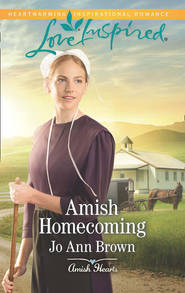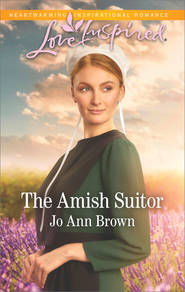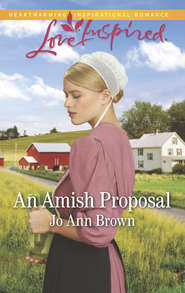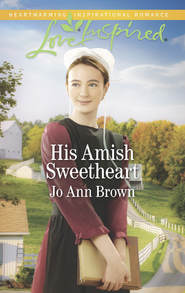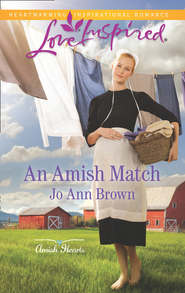По всем вопросам обращайтесь на: info@litportal.ru
(©) 2003-2024.
✖
A Bride for the Baron
Настройки чтения
Размер шрифта
Высота строк
Поля
Nodding, the footman said, “I won’t. From this point forward.”
“I am pleased to hear that.” He motioned for Jessup to hand the message to Miss Kightly, and the footman held out a folded sheet to the pretty blonde.
As she opened it, he shifted his gaze toward Miss Fenwick. She stood beside her brother, her hand on his arm in a comforting pose. Not that he was surprised. Miss Fenwick was very supportive of her brother and his ministry. He had known that before, but her request by the remnants of the burned-out church was proof of her devotion to him.
Edmund looked away. Miss Fenwick’s determination to help her brother with his parish must have been what had persuaded her to ask Edmund’s assistance in rebuilding the church. How long would it take for her to realize she had made the request of the wrong man? His gut churned at the idea of having the respect he had seen in her eyes turn to pity.
Pitiful.
He had heard others whisper the word when they thought he could not hear. Even though his closest friends had never spoken so, he knew what was in their heads. It was a pity that Edmund Herriott, who once could be depended on to make a quick decision, now could make none at all. Not good. Not bad.
Pitiful.
A groan sounded in the entry, and, for a moment, he wondered if it had escaped from him.
Miss Fenwick rushed to Miss Kightly’s side, asking her what was wrong, and he shoved away his thoughts that punished him over and over.
Miss Kightly’s smile was forced. “Forgive me. I am simply surprised at the message from my great-uncle.”
“Do you want to share what Sir Nigel has to say?” Miss Fenwick asked.
“Yes, I guess I should. He says that...” Her voice trailed off.
Miss Fenwick looked toward Edmund, and he shrugged. He could think of several possible subjects Sir Nigel might have written about, especially in light of what had happened at the church and what had been discovered.
He was not surprised when Miss Kightly said, “My great-uncle has sent word that I should be ready to return to his house.”
“When?” he asked.
She looked at the note, a lovely golden strand of hair slipping across her pale cheek. “It says only that he will come for me today.” Again a strained smile edged along her lips. “’Tis good then that there has not been enough time to unpack my bags.” She folded the page and looked around.
The footman jumped forward to take it from her at the same time Edmund reached toward her. Jessup backed away with an apology.
Edmund nodded toward him, then said, “If you wish to sit in the small parlor, I will have a hearty tea brought for us.”
“Sit?” Miss Fenwick said with an unexpected laugh. “We have been doing far too much of that.”
He savored the sound of her laugh. It lilted like a lark over a spring field, bringing the warmth of sunshine into the entry hall. When she looked at him, he chuckled, caught up in her amusement.
“I stand corrected,” he replied.
That set off another round of laughter from both ladies, though the vicar remained as somber as his dark clothes. Edmund had to pause to realize what he had said that was funny.
“No,” Miss Fenwick said, “we all stand corrected.”
Were her words a gentle reminder that his guests were exhausted? Maybe so. Maybe not. As with everything else, he could not decide.
But, even if the words were meant only as a jest, he needed to think of his guests’ needs. And his own. His clothes were wet, and they stank of ashes and brandy. He glanced toward the stairs, wondering which rooms were ready for guests. At Christmas, when his other cousin had wed, the Meriweather women had overseen all such preparations.
As if he had spoken aloud, Jessup said, “Lady Meriweather left instructions for where the vicar and his sister and Miss Kightly would stay.”
Thank God for Lady Meriweather’s foresight. He was able to wear a genuine smile as he said, “Jessup will show you to your rooms whenever you wish.”
Miss Fenwick turned to her brother who had not said a word since they had left the church. “Gregory, why don’t you rest? I doubt you have slept an hour since the fire.”
“I can try.” The vicar’s voice was a shadow of its usual booming warmth. “I probably won’t sleep. Every time I close my eyes, I see that inferno rising up from the depths to consume the church. Every time I let my mind wander, it takes me immediately to the moment when I first saw the flames and knew all I have worked for was being destroyed.”
Edmund had to look away before the vicar saw that hated sympathy and pity on his face. He did not want to subject any other person to that expression.
“Try to rest today,” Miss Fenwick said quietly. “You are going to need to be rested for the work yet to be done in rebuilding the parish church.”
“So they can burn it down again?”
Miss Fenwick gasped at the venom in her brother’s voice. “Gregory—”
“Someone should have put a halt to these smugglers by now.” His fury focused on Edmund. “Why haven’t you? Is it because your life’s work isn’t in danger?”
The vicar’s words lashed through Edmund. Through Miss Fenwick, too, if he judged by how her face became a sickly gray. Miss Kightly stared at the vicar as if she had never seen him before. No one spoke as the last echoes of Mr. Fenwick’s words faded from the entry hall.
Again it was Miss Fenwick who spoke first. “You are exhausted, Gregory. You barely know what you are saying.” She put her arm around him, and he wove like a sailor on a ship in a storm. He leaned on her as his head lolled, and she began to buckle.
Edmund leaped forward to pull the vicar’s other arm over his shoulder and help keep both Mr. Fenwick and his sister on their feet. He got the man steady only when the footman Foggin grasped the vicar’s arm that was draped over Miss Fenwick and drew it over his own shoulder. Miss Fenwick stepped back, her blue eyes wide with despair. She grasped Miss Kightly’s hand like a lifeline.
“Jessup and I can get him upstairs to rest, my lord,” Foggin said.
“I want to see that he is settled in,” Miss Fenwick said in a crisp voice that suggested nothing anyone said would change her mind.
“And, if someone could escort me to where my bags were taken,” Miss Kightly said, “I would greatly appreciate it.”
A glance he could not read flashed between the two women, and Miss Fenwick asked, “If you don’t mind, my lord, can Jessup assist Miss Kightly while we see to Gregory?”
It sounded like a reasonable solution, though he knew he could never have come to it on his own. Everyone looked at him, so he nodded. He loathed admitting, even to himself, how grateful he was for Miss Fenwick’s suggestion. He had no idea how long they all would have stood in the entry hall while he tried to determine what to do next.
With a smile and a nod to Jessup, Miss Kightly went up the long staircase, with the footman following like a well-trained puppy. No man of any class could be immune to the blonde’s ethereal beauty. She was like a fairy tale princess come to life.
He shook the thought out of his head. Now was not the time to admire Miss Kightly. The vicar needed his help. Telling Foggin that they would start at the count of three, he took a deep breath. The vicar was completely senseless and, therefore, dead weight.
As they climbed, Edmund wondered if he could have managed to help lug the vicar up the stairs before he had gone to the Continent. The life there had hardened his muscles in ways he had never imagined. In comparison with hefting cannon and gunpowder casks, the vicar was a light load. It had not been an officer’s place to handle such tasks, but, in battle, everyone pitched in to help where they could.
Just as Miss Fenwick asked you to help with the church.
He grimaced at how easily she slipped into his thoughts when he was not on guard to prevent it.
“I can send for another footman, my lord,” Foggin said.
“If you need to be relieved...”
“Nay, my lord.” The footman stumbled over his words as he added, “I meant to take over for you.”






